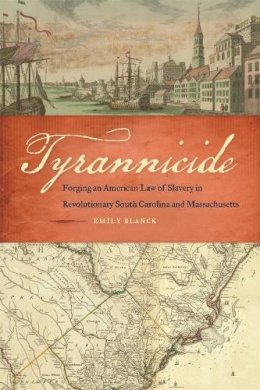
Tyrannicide: Forging an American Law of Slavery in Revolutionary South Carolina and Massachusetts (Studies in the Legal History of the South Ser.)
Emily Blanck
Tyrannicide uses a captivating narrative to unpack the experiences of slavery and slave law in South Carolina and Massachusetts during the Revolutionary Era. In 1779, during the midst of the American Revolution, thirty-four South Carolina slaves escaped aboard a British privateer and survived several naval battles until the Massachusetts brig Tyrannicide led them to Massachusetts. Over the next four years, the slaves became the center of a legal dispute between the two states. The case affected slave law and highlighted the profound differences between how the “terrible institution” was practiced in the North and the South, in ways that would foreground issues eventually leading to the Civil War.
Emily Blanck uses the Tyrannicide affair and the slaves involved as a lens through which to view contrasting slaveholding cultures and ideas of African American democracy. Blanck’s examination of the debate analyzes crucial questions: How could the colonies unify when they viewed one of America’s foundational institutions in fundamentally different ways? How would fugitive slaves be handled legally and ethically? Blanck shows how the legal and political battles that resulted from the affair reveal much about revolutionary ideals and states’ rights at a time when notions of the New Republic—and philosophies about the unity of American states—were being created.
Product Details
About Emily Blanck
Reviews for Tyrannicide: Forging an American Law of Slavery in Revolutionary South Carolina and Massachusetts (Studies in the Legal History of the South Ser.)
Douglas R. Egerton
author of Death or Liberty: African Americans and Revolutionary America?
Anyone interested in the Revolutionary period, slavery, or the development of slave law in the new nation, will find use for Blanck’s succinct work.
Jeffrey Thomas Perry
Civil War Book Review
Tyrannicide is a short and easy read, and its concise descriptions of the history (economic, political, and legal) of slavery in Massachusetts and South Carolina both in the colonial and revolutionary periods make it ideal for any class exploring slavery and abolition in the era of the American Revolution.
C. Messer
H-Net Reviews
Blanck’s ambitious work . . . reminds readers . . . that forging the U.S. government was, in large measure, about forging slave law. She reaches this conclusion with innovative sources and methodology.
Christine E. Sears
Journal of Southern History
